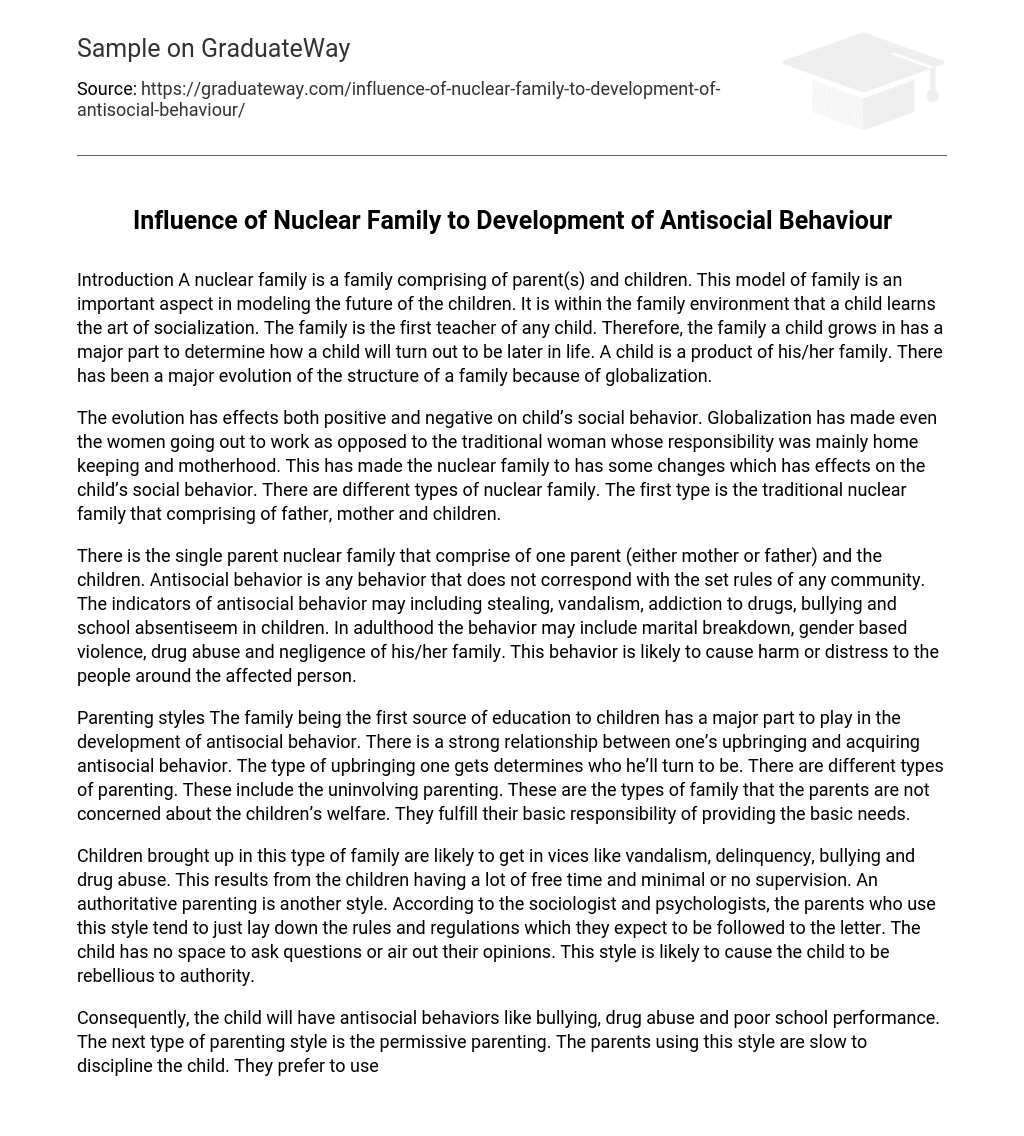Introduction A nuclear family is a family comprising of parent(s) and children. This model of family is an important aspect in modeling the future of the children. It is within the family environment that a child learns the art of socialization. The family is the first teacher of any child. Therefore, the family a child grows in has a major part to determine how a child will turn out to be later in life. A child is a product of his/her family. There has been a major evolution of the structure of a family because of globalization.
The evolution has effects both positive and negative on child’s social behavior. Globalization has made even the women going out to work as opposed to the traditional woman whose responsibility was mainly home keeping and motherhood. This has made the nuclear family to has some changes which has effects on the child’s social behavior. There are different types of nuclear family. The first type is the traditional nuclear family that comprising of father, mother and children.
There is the single parent nuclear family that comprise of one parent (either mother or father) and the children. Antisocial behavior is any behavior that does not correspond with the set rules of any community. The indicators of antisocial behavior may including stealing, vandalism, addiction to drugs, bullying and school absentiseem in children. In adulthood the behavior may include marital breakdown, gender based violence, drug abuse and negligence of his/her family. This behavior is likely to cause harm or distress to the people around the affected person.
Parenting styles The family being the first source of education to children has a major part to play in the development of antisocial behavior. There is a strong relationship between one’s upbringing and acquiring antisocial behavior. The type of upbringing one gets determines who he’ll turn to be. There are different types of parenting. These include the uninvolving parenting. These are the types of family that the parents are not concerned about the children’s welfare. They fulfill their basic responsibility of providing the basic needs.
Children brought up in this type of family are likely to get in vices like vandalism, delinquency, bullying and drug abuse. This results from the children having a lot of free time and minimal or no supervision. An authoritative parenting is another style. According to the sociologist and psychologists, the parents who use this style tend to just lay down the rules and regulations which they expect to be followed to the letter. The child has no space to ask questions or air out their opinions. This style is likely to cause the child to be rebellious to authority.
Consequently, the child will have antisocial behaviors like bullying, drug abuse and poor school performance. The next type of parenting style is the permissive parenting. The parents using this style are slow to discipline the child. They prefer to use dialogue method of discipline. Their children are at liberty to do what is they wish. Although they will receive discipline; it is not the corporal punishment. The children brought up in this type of style are likely to become thieves, vandalize properties and frequent absentiseem from school.
Socioeconomic status of a family The socioeconomic status of a family has a major role to play in development of child’s behavior. the family’s socio economic status is likely to have a psychological effect on the parent which is consequently transferred to the child. The economically disadvantaged parent is likely to be under stress most of the times as they try to offer make the ends meet. They will have little or no time for the children. The children will seek counsel from their peers and may get the wrong advice.
The family’s socioeconomic status determines where they stay. They are likely to stay in the cheap neighborhood which maybe insecure. The children may get involved with the gangs mostly associated with this neighborhood. The children will get antisocial behavior including delinquency, gender based violence and even stealing. The quality and quantity of education one receives is determined by your economic status. The disadvantaged families will offer their children little and poor quality education. The children will be less competitive in the society.
This will lead to frustration which can cause them to get into antisocial behavior like stealing, drug abuse and others. The socioeconomic status determines the mental stability of the parents. Domestic violence is common among the economic disadvantages. The children who grow up in a family that is violent are likely to reciprocate the same in the adult years. The children will become violent especially the gender based violence. The children may get involved in the gangs in the neighborhood as they look for love and acceptance, they are not receiving at home.





